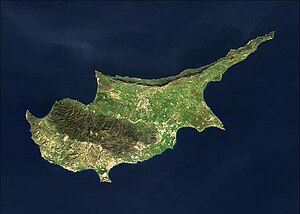Second Cyprus Deal: A Bank Robbery with a Geopolitical Aspect
 |
| (Photo credit: Wikipedia) |
The whole thing has accelerated the disintegration of the euro system. As the former Central Bank Governor of Cyprus Athanasios Orphanides, told the Financial Times on March 23
"the European project is crashing to Earth. This is a fundamental change in the dynamics of Europe towards disintegration and I don't see how this can be reversed."
"We have seen a cavalier attitude towards the expropriation of property and the bullying of a people," Orphanides said.The new deal over Cyprus has lifted the levy on bank deposits up to EU100,000 Euros (the fig leaf), but it is going to extract up to 40% on larger deposits, as part of the liquidation of Laiki bank (Cyprus Popular Bank).
There is a geopolitical aspect in this.
According to Bloomberg, one-third of all the money deposited in Cyprus banks is owned by Russian nationals. Most of the deposits larger than EU100,000 are Russian. This is because Russian firms have used Cyprus as financial basis for their commercial operations, due to its very low tax regime (similar to Ireland, for instance). Thus, Cyprus has become the third largest "foreign" investor in Russia. By deciding to put most of large deposits into the "bad bank" part of the liquidated Laiki bank, the Troika has consciously targeted Russian investors.
This explains enraged reactions from Russian leaders, from Prime Minister Medvedev to economist Sergei Glazyev (see slug). That Russian investors are the big losers, and that the targeting of Russia was no innocent choice or just an objective result of an "equal" correction of the deal, is shown by the central role played by the British government. On March 23, a high-level British team was flown into Cyprus to "advise" on the terms of the deal. The team was led by U.K. Treasury mandarin Tom Scholar, who is the Treasury's second permanent secretary and the official who managed the bailouts of Northern Rock, Royal Bank of Scotland, and Lloyds Banking Group. We know how those bailouts ended up: The banks were nationalized and the entire speculative debt was backed up by British taxpayers.
It is not to be excluded that the anti-Russian gambit was an aspect deliberately pushed by the City of London gamemasters, in the context of the British Empire's overall anti-Russian policy at strategic level. British-controlled or pro-British media are the ones who have created the image of Cyprus as a "money-laundering" base, characterizing Russian investments as "mafia" money. This has provided a "moral" justification for the Troika decisions. In reality, Cyprus has not been a money-launderer any more than other offshore financial centers, such as British Isle of Man or the City itself. And speaking of an "overblown" financial sector relative to GDP, Cyprus with its 8:1 ratio is way behind Luxembourg, which has a 24:1 ratio! In this context, the sudden death of fugitive oligarch Boris Berezovsky on March 23 in London, is seen by someone as "the first victim of the Cyprus crisis."
Another big lie pushed by the Troika is that the new deal represents an "Icelandic solution" for Cyprus. This is a totally superficial and deeply wrong comparison. First, Iceland had its own national currency and could devalue it. An Icelandic solution for Cyprus would be a return to a national currency. But that is exactly what the Troika wanted to prevent. Secondly, Iceland separated the domestic debt from the foreign debt. De facto, this was a separation between a debt somehow linked to the real economy and a fictitious financial debt. For Cyprus this would mean to separate a fictitious debt related to the EU bubble carry trade from London and other places into insolvent Greek bonds, for instance from the commercial debt. Most of Russian investors' money would probably fall into the second category. The Cyprus deal consists in refinancing the rotten debt, liquidating one bank (Laiki) at the expense of Russian investors, and keeping one bank (Bank of Cyprus) alive with revenues from the bank robbery. At these conditions, the Troika will guarantee a EU10 billion loan which will be used to refund foreign lenders in the Eurozone.
However, since the damage has been already done, and nobody feels any longer that his money is secure in any bank, Cyprus will introduce capital controls in the attempt to prevent capital flight. This will de facto establish a second-class "euro" currency in Cyprus, a currency you can get into, but you cannot get out of. And will not prevent capital flight anyway.
Source - LaRouche
No comments:
Post a Comment